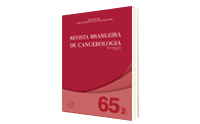Weight Gain during Systemic Oncologic Therapy for Breast Cancer: Changes in Food Intake and Physical Activity
DOI:
https://doi.org/10.32635/2176-9745.RBC.2019v65n2.360Keywords:
Breast Neoplasms/therapy, Weight Gain, Eating, ExerciseAbstract
Introduction: Weight gain frequently occurs during treatment for breast cancer. Objective: To evaluate changes in dietary intake and physical activity in the weight evolution of women on systemic oncologic treatment for breast cancer. Method: The prospective and comparative study included 89 women submitted to systemic oncologic treatment for breast cancer, grouped according to the occurrence of weight gain in relation to body weight documented before beginning treatment. Patients were classified as 1) Group with weight gain (those with an increase in body weight greater than or equal to 2% over pre-treatment weight); 2) Group without weight gain (those who maintained or lost weight during treatment). We calculated body mass index (BMI) of patients and analyzed their body composition by bioelectrical impedance (BIA). Changes in food intake, gastrointestinal symptoms, and physical activity level, as well as reductions in muscle and fat mass, were documented. Results: Tumor staging (p=0.24), use of antineoplastic drugs (p=0.23) and intention of treatment (p=0.61) were no different between the weight gain group (n=36) and no weight gain group (n=53). No difference was found in anthropometric and BIA data between the groups during oncologic treatment. Frequency of gastrointestinal symptoms was not different between the groups. However, increased food intake and bed rest, and a decrease in physical activity level were more frequent among women who gained weight during therapy. Conclusions: Weight gain in women undergoing systemic oncologic therapy for breast cancer may be, at least in part, caused by higher energy intake and lower physical activity.
Downloads
Downloads
Published
How to Cite
Issue
Section
License
Os direitos morais e intelectuais dos artigos pertencem aos respectivos autores, que concedem à RBC o direito de publicação.

This work is licensed under a Creative Commons Attribution 4.0 International License.









